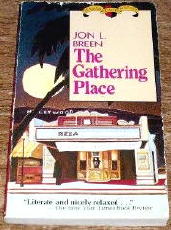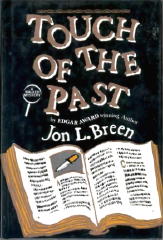Tue 1 Sep 2009
Reviewed by Marvin Lachman: JON L. BREEN – The Gathering Place.
Posted by Steve under Bibliographies, Lists & Checklists , Characters , Crime Fiction IV , Reviews[4] Comments
by Marvin Lachman
JON L. BREEN – The Gathering Place. Walker, hardcover, 1984; paperback, September 1986.

I’m on record as having serious reservations about occult and horror fiction, feeling most works in those genres are “copouts” in which the authors do not play by the “rules” of reality.
Jon L. Breen’s The Gathering Place contains one unexplainable element, the ability of its heroine, Rachel Hennings, to, without practice, imitate the signatures of famous authors like ErIe Stanley Gardner. The plot device of automatic writing doesn’t help what is otherwise a classic detective story, but it doesn’t hurt it enough to keep me from recommending thls book.
The setting is a famous old bookstore, on Santa Monica Boulevard in Los Angeles, recently inherited by Hennings from her uncle. There is real murder to go with the supernatural, and soon Rachel is acting as detective, with some help from a psychology professor, a reporter, and a Los Angeles Police detective.
Hennings is a, strong enough character that she probably doesn’t need that many extra detectives. The mystery is crisply told and satisfactorily resolved, by strictly logical means. A real bonus is the atmosphere of an old-fashioned book store as seen through the eyes of an author who obviously loves old books.
Bibliographic Data. [Expanded from the Revised Crime Fiction IV, by Allen J. Hubin.]
HENNINGS, RACHEL
The Gathering Place. Walker, hc, 1984.
A Piece of the Auction. EQMM, July 1986. [Short story.]
Starstruck. Murder in Los Angeles, Adams Round Table, Morrow, 1987. [novelette]
Touch of the Past. Walker, hc, 1988.

Rachel and the Bookstore Cat. Danger in D.C., ed. Martin H. Greenberg & Ed Gorman, Donald I. Fine, 1993. [short story]
September 2nd, 2009 at 4:52 am
Frank D. McSherry proposed what he called the Janus Resolution, which was a mystery whose solution could be interpreted as either supernatural(or science fictional) or not, in short the question left in the reader’s mind. Good examples include Helen McCloy’s Through A Glass Darkly and Mister Splitfoot, Leslie H. Whitten’s Progeny of the Adder, James Blish’s The Frozen Year and A Case of Conscience, and many stories from the Simon Ark and Solar Pons series (though in later years the Ark stories tended to wholly naturalistic explanations of events that seemed supernatural).
It’s hard to pull off, but effective when done right. To those McSherry lists I would add Russell Greenan’s It Happened in Boston?, Woolrich’s Night Has 1000 Eyes, and Charles McCarthy’s The Watcher.
And in defense of the strictly supernatural or sf mystery I think you have to list Hjortsberg’s Fallen Angel, Kotzwinkle’s Fata Morgana and The Game of Thirty, and a few others. Dorothy McCardle’s Dark Freehold (The Uninvited) is a ghost story that develops very much like a detective story with genuine detective work pursued by the protagonists, and many of the best known works from the classic pulp Unknown used the genre’s staples in L. Ron Hubbard’s Fear, Williamson’s Darker Than You Think, and Eric Frank Russell’s Sinister Barrier or later books in that tradition like Wilson Tucker’s Warlock.
I’m a little less enthusiastic when the supernatural element is direct and obvious, but unwilling to discount books like Carr’s The Burning Court and The Devil in Velvet, or all the classic supernatural sleuths from Carnaki to Michael Avallone’s The Satan Sleuth.
As discussed elsewhere here there are great classic supernatural tales, and the genre does have a history of them — Barzun and Taylor added a section on ghost stories to Catalogue of Crime for that very reason.
That said the recent spate of psychics and vampires playing at detective is a bit tiresome, though I’m sure there are some worth getting to know. I’ll confess to enjoying a few of Laurel Hamilton’s tough Anita Blake books despite all the vampires and werewolves.
I just don’t think it is any worse for the genre than too many private eyes or lawyers, or hard nosed cops or any other staple. Something else will come along and someone will be wondering what happened to all those wonderful vampire and psychic sleuths.
And in all honesty the amateur detective or hardboiled private eye isn’t a good deal more realistic in many cases. True they aren’t impossible, but in many cases they certainly stretch the boundaries of reality. I love Philo Vance, but I don’t think I could begin to suggest there is anything natural or realistic about his entire career.
I suppose we should just be grateful geriactric vampire lawyer sleuths living in small New England towns haven’t caught on yet — Murder Takes A Big Bite.
September 2nd, 2009 at 12:53 pm
I’m far more a fan of Science Fiction than I am of Fantasy, so for the most part, I’m sympathetic to those who say that elements of the fantastic have no business showing up in detective fiction, but not entirely.
I once reviewed a fantasy novel in which my primary complaint was that it read as if the author was making up the rules as he went along. Boy, did that raise a few howls.
But as long as the “rules” are well-established in advance, or as in Jon Breen’s book, it “contains [only] one unexplainable element,” as Marv says, with me adding the “only” for emphasis, I’m more than happy to go along for the ride.
I’ve read — and enjoyed — almost all of the examples you’ve provided, David, except for the current stuff like the Anita Blake books, which I see no harm in sampling either.
And if there’s a market for werewolf and vampire detective fiction, there’s no downside in either an author or a publisher making money on them. While they can.
September 2nd, 2009 at 10:03 pm
The reason I like Campbellian fantasy in the Unknown tradition is that it does have rules. Williamson in Darker Than You Think uses quantum theory to explain lycanthropy, and in de Camp and Pratt’s famous Harold Shea series rules are always tripping the hero up — for instance where magic works technology like guns don’t.
But the fantasy and horror element when used right in mystery fiction can produce some entertaining books, and even in books like Rim of the Pit or most of the Simon Ark stories the sniff of sulfur and brimstone can add a good deal to the atmosphere of the story. Paul Gallico’s The Hand of Mary Constable is a good example of a book where the supernatural exerts a good deal of entertainment before being explained away.
Among others that pursue the supernatural from the point of view of a thriller or detective novel I’d suggest Jessie Douglas Keruish Undying Monster and Gordon Honeycombe’s dark psychological thriller Neither the Sand Nor the Sea. A few of Katherine Kurtz’s The Adept series are entertaining too.
It may not be politcally correct but I just can’t toss out Sax Rohmer, Dennis Wheatley, and Jack Mann because they let the supernatural spill over into detective stories, and I’m always happy to find someone new with half their storytelling ability like Preston and Childs doing the modern equivalent.
September 3rd, 2009 at 1:28 am
Just thought of one of the best mixes of detective story and fantasy, James Gunn’s The Magicians, a delightful hard boiled tale that mixes the two genres perfectly. I’d also nominate Robert Heinlien’s “The Unpleasant Profession of Jonathan Hoag,” and William Sloane’s The Edge of Running Water as perfect examples of the blend.
That said, it takes extraordinary talent to bring it off, and when it is attempted by lesser talents you can expect it to fall spectacularly flat.